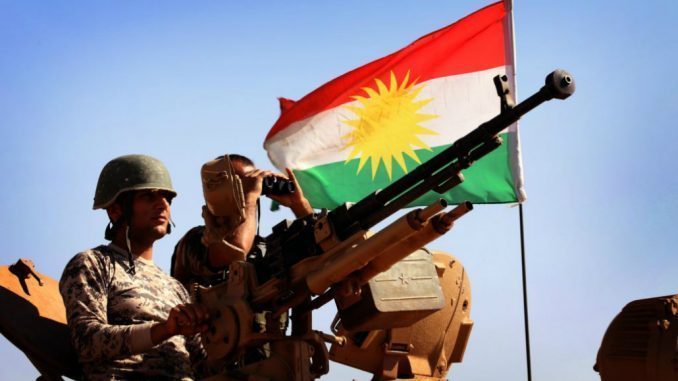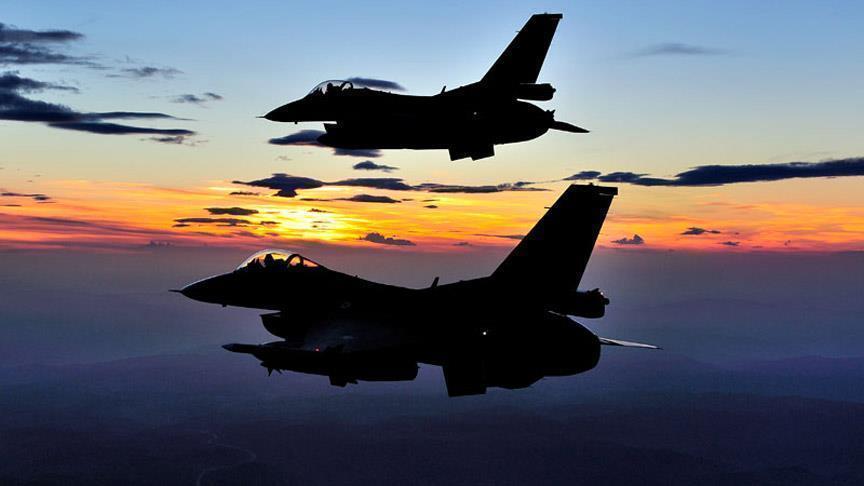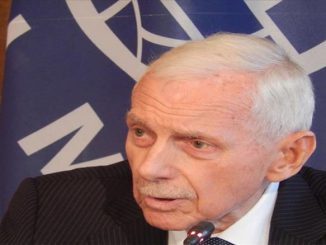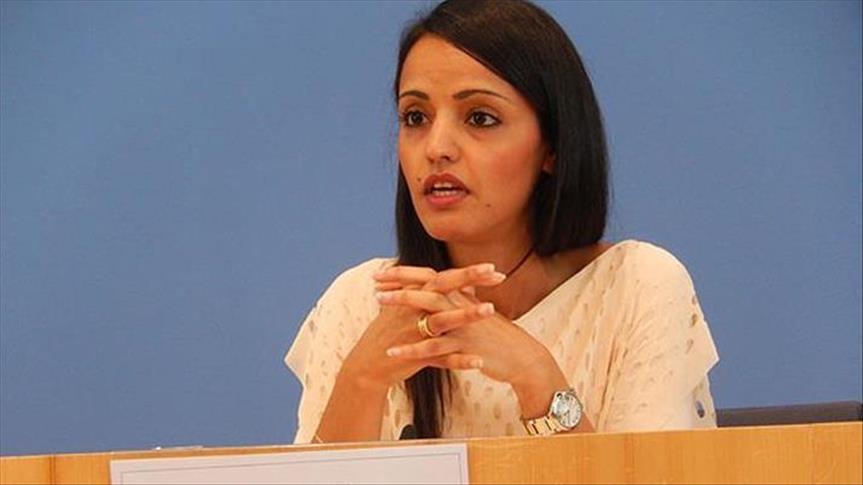
Iraq’s Kurds plan to hold a referendum on independence this year to take advantage of ISIS’ expected defeat, a senior Kurdish official said, while this move is expected to cause tension with Turkey, Iran, and the central Iraqi government.
At the height of its power two years ago, Islamic State ruled over millions of people in territory running from northern Syria through towns and villages along the Tigris and Euphrates river valleys to the outskirts of Baghdad in Iraq.
However, ISIS’s territory is shrinking rapidly since last year as the US-led coalition, the Turkish-backed forces, and the Russian-backed Assad regime forces have fierce fights against its forces in both Syria and Iraq.
The United States is providing air and ground support to Iraqi and Kurdish forces trying to dislodge the hardline group from Mosul.
The Kurdish militias played a major role in the U.S.-backed campaign to defeat Islamic State.
Iraqi forces captured the eastern side of Mosul in January after 100 days of fighting and launched their attack on the districts that lie west of the Tigris river on Feb. 19.
While the fall of Mosul would effectively end the “caliphate”, it will not solve deep divisions over power, land and resources between Iraq’s Shi’ite Arab, Sunni Arab and Kurdish communities.
Referendum on independence
The Kurds already run their own autonomous region in northern Iraq and the official, Hoshiyar Zebari, indicated the expected ‘yes’ outcome in a vote wouldn’t mean automatically declaring independence.
But with Kurdish forces also controlling wider territory regained from Islamic State, the referendum plan adds to questions about Iraq’s unity after the militants have been ousted from Mosul.
The two main Kurdish parties, the Kurdistan Democratic Party (KDP) and the Patriotic Union of Kurdistan (PUK), agreed at a meeting on Sunday that a referendum should be held this year, Zebari, a senior member of the KDP leadership, told Reuters.
“The idea of a referendum has been re-energized,” Zebari, a former Iraqi foreign and finance minister, said in an interview in Erbil on Wednesday evening, commenting on the meeting held with the PUK’s leadership.
The two rival Kurdish groups issued a joint statement on Sunday declaring support for the plan of holding a referendum, leaving its exact timing to an agreement with other, smaller Kurdish groups.
Zebari described the aim as “self-determination”, leaving open the exact nature of any deal with Baghdad following the referendum when Kurds would be likely to vote strongly for independence.
“It will give a strong mandate to the Kurdish leadership to engage in talks with Baghdad and the neighbors in order to get the best deal for Kurdish self-determination,” he said.
Raising the Kurdish flags
the decision for a referendum comes just one week after the council voted in favor of raising the Kurdish flag on municipal buildings in the city of Kirkuk.
The decision raised the ire of the city’s Turkmen minorities who protested the flag raisings and with Turkmen and Arab members of the council boycotting the most recent vote on the referendum, tensions in the region are high as it seeks to rebuild post-ISIS.
“If there is a referendum for Kurdistan, that should include Kirkuk as well,” Kirkuk’s governor Najmaldin Karim told Middle East Eye. “We have a lot of grievances with Baghdad. It’s a strong, centralized and inefficient, incompetent administration. Baghdad is very controlling, and the constitution says Iraq should be federal.”
Karim believes that a vote on the future of Kirkuk should be included on any referendum vote on the independence of Kurdistan. Observers in Baghdad and elsewhere in the region have been quick to condemn what they see as unilateral moves to annex Kirkuk to the KRG.
Kurds have long claimed Kirkuk and its huge oil reserves. They also see their city as their historical capital.
the Iraqi parliament on Saturday overwhelmingly voted to repeal the decision to hoist the flag over municipal buildings, while both Iraq and Turkey also condemned the raising of the flag.
“As you know, for a time now there has been talks that Iraq will split into three regions of Kurds, Shi’ites, and Sunnis,” Iraq’s prime minister, Haider al-Abadi told Kurdish website Rudaw on Saturday.
“But that is totally objectionable. We are serious about Iraq’s territorial integrity.”
The KRG government rejected the Iraqi demands, arguing that the Kurds’ role in defending Kirkuk against Islamic State justified the hoisting of their flag.
“If it wasn’t for the Peshmerga, there would be neither Iraq’s flag in the city nor Kurdistan’s,” KRG Prime Minister Nechirvan Barzani told reporters in Erbil on Wednesday.
Masrour Barzani, head of the KRG’s Security Council and son of President Barzani, said in June that Iraq should be divided into three separate entities to prevent further sectarian bloodshed, with a state each given to the Shi’ites, the Sunnis and the Kurds.
Regional tension
Iraqi Kurdish independence has been historically opposed by Iraq and also its neighbors, Iran, Turkey and Syria, as they fear the contagion for their own Kurdish populations.
Iraq’s Kurds are the community to have advanced the most toward their long-held dream of independence. Iraq has been led by the Shi’ites since the overthrow of Saddam Hussein, a Sunni, in 2003, following a U.S.-led invasion.
They run their own affairs in the north, through a Kurdistan Regional Government (KRG), led by KDP leader Massoud Barzani.
They have their own armed force, the Peshmerga, which prevented in 2014 Islamic State from capturing the oil region of Kirkuk, after the Iraqi army fled in the face of the militants.
Turkish Prime Minister Binali Yildirim said last week that his country would not accept any attempt to declare an independent Kurdistan and to incorporate Kirkuk into the KRG despite their relatively close ties with the KRG. He also disputed the Kurdish historical claim to the city, telling Turkish TV on Saturday that Kirkuk was “a Turkmen city.”
Turkish President Tayyip Erdogan also warned the Kurds on Tuesday that failure to lower the Kurdish flags would damage their relations with Turkey.
“We don’t agree with the claim ‘Kirkuk is for the Kurds’ at all. Kirkuk is for the Turkmen, Arabs and Kurds, if they are there. Do not enter into a claim that it’s yours or the price will be heavy. You will harm dialogue with Turkey,” he said at a rally in the Black Sea province of Zonguldak.
“Bring that flag down immediately,” he also said.
Iran has waded into the Kirkuk flag controversy with a government spokesperson expressing support for Iraq’s territorial integrity and warning against increasing tensions in the country.
“Hoisting any flag except Iraq’s national flag in Kirkuk in northern Iraq is contradictory to the country’s constitution and will increase tensions,” said Foreign Ministry Spokesperson Bahram Qassemi, as reported by Fars News.
He warned against dividing the attention of the Iraqi government, adding that Iran remains steadfast in its support for Iraq’s territorial integrity and national sovereignty.
Hardline Iranian-backed Iraqi Shi’ite militias have threatened to expel the Kurds by force from this region and other disputed areas.
The United Nations has also weighed in to oppose the Kurdish flag in Kirkuk. Kurdish officials, however, remain unperturbed. “It is impossible for Kurdistan’s flag to be lowered again,” said Rebwar Talabani, the acting head of the provincial council.



